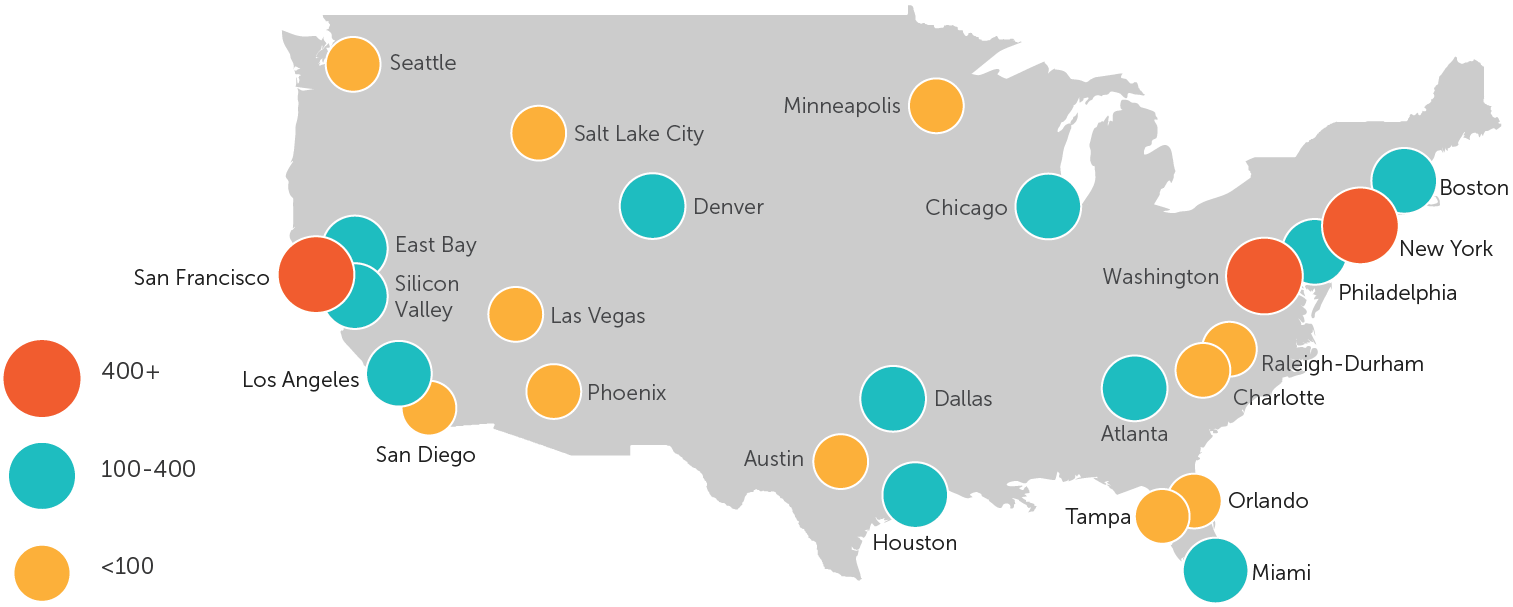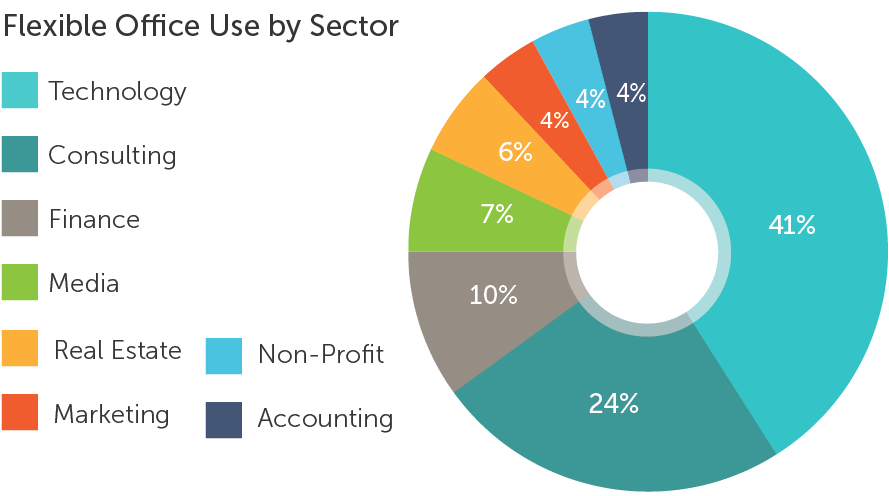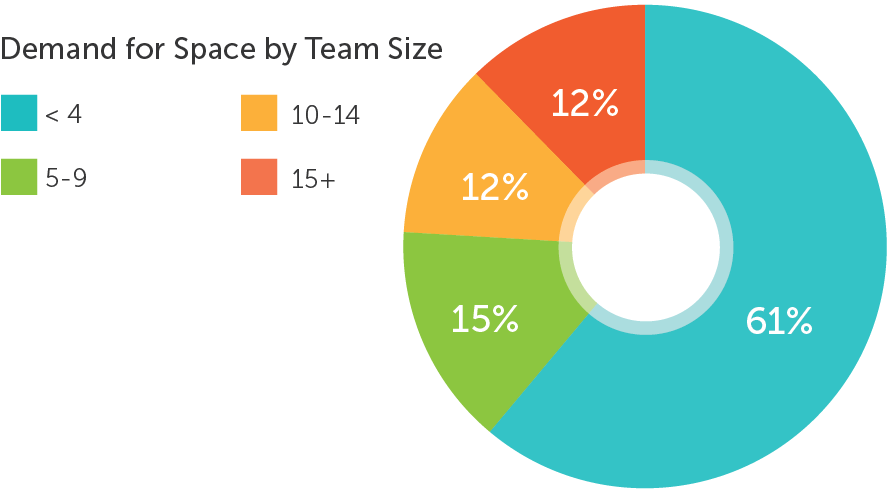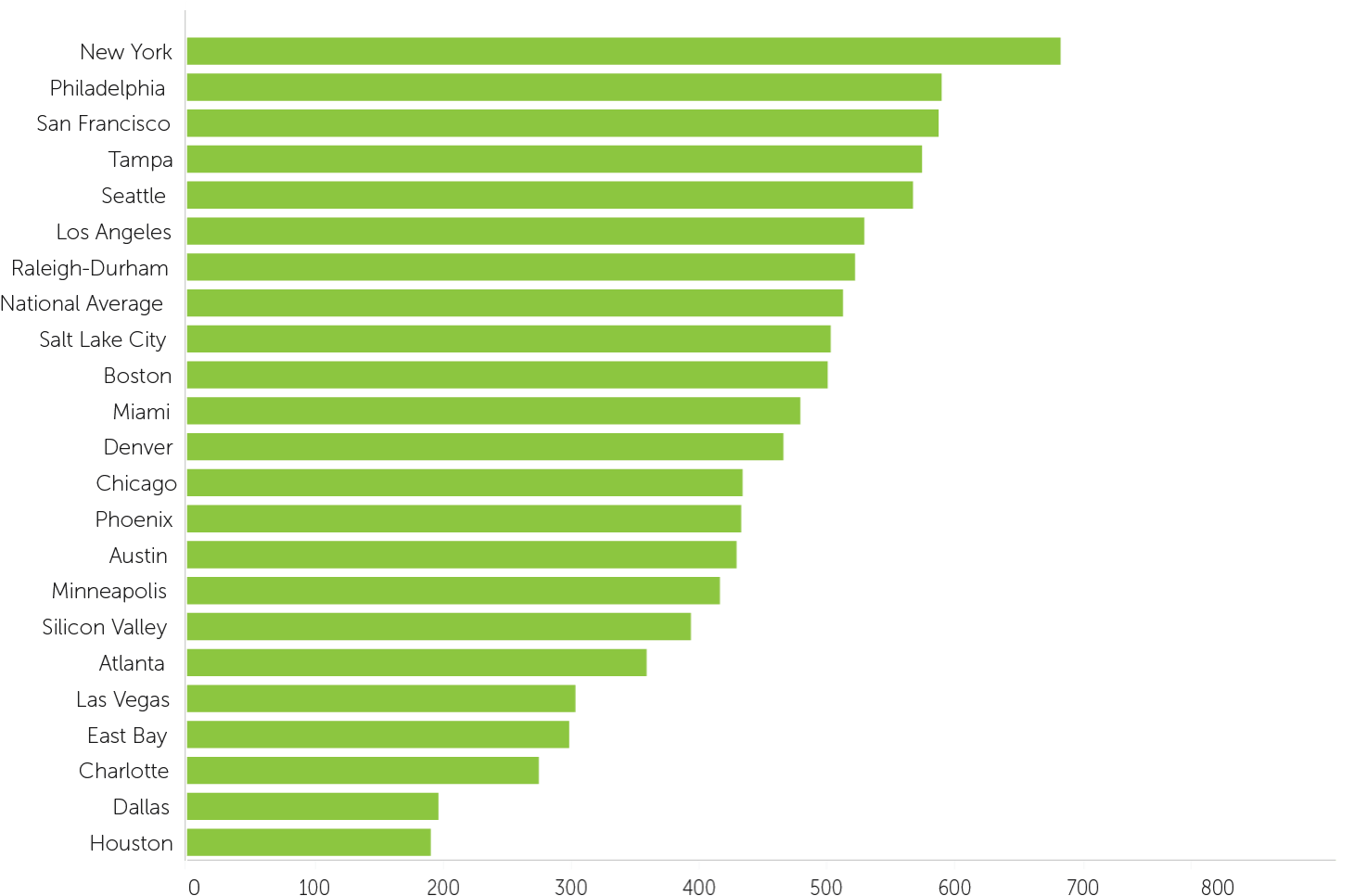
Flexible office space has been one of the hottest topics in the commercial
office market. The rise of Coworking has dominated headlines but activity and
supply of flexible office space includes much more than just Coworking.
Over 30% of the public listings on LiquidSpace come from private businesses,
who are sharing their extra space, while building owners have also jumped into
the mix. The amount of Direct Landlord space doubled in the last year and
now account for 7% of the publicly available supply, a number we expect to
continue to grow rapidly as more owners begin entering the LiquidSpace
network.
The flexible office market is clearly taking off. Read on to understand what,
and who, is driving the growth and where this category is headed over the
coming year and beyond.
Current Available Workspaces in Top 25 US Markets

Companies Want Flexibility
Nearly Every Type of Business Needs Flexibility
In this new era of shortened business
cycles, contract assignments, and
as-needed staffing, regional sales teams,
consultants, and distributed workforces
have begun to embrace flexible office
space. The need for flexibility, to position
teams close to customers or a key
partner, or to tap another market for
talented workers are just some of the
underlying factors motivating companies
to book flexible space. Not surprisingly,
technology companies lead the category
of companies currently demanding
flexible space, followed by consulting,
financial services, and a wide range of
other sectors.

Rising construction costs and a
challenging environment for new
development have also pushed tenant
improvement costs to record levels
making the cost for committing to
long-term space more burdensome.
As goods such as cars, food, hospitality
and even employment embrace the
flexibility afforded in an on-demand
marketplace, tenants are increasingly
demanding flexibility in their office space.

An Increasingly Mobile Workforce
The ubiquity of cellphones, laptops, fast
wifi, video conferencing, cloud
computing, and collaboration software
has freed many office workers from the
need to drive to a central office each
day. Many companies have realized that
in the competitive battle for skilled
workers, workplace flexibility is a potent
weapon to attract talent. Giving back
several hours of commuting time each
day is an attractive incentive.
Yet working from home or the proverbial
coffee shop are not ideal options for
many workers. Teams still need office
space to meet customers, to collaborate
with teammates, or to simply have a
place to focus without distractions.
These benefits, as well as many more,
are driving demand for flexible
alternatives.
A Variety of Suppliers are Providing Space
Traditional owners now see flexibility as
a tool to fill spaces where traditional
5-year deals don't fit. They also realize
that providing flexible alternatives attract
fast-growing companies that could be
the anchor tenants of the next cycle.
Private businesses are also getting in on
the action, recognizing the opportunity
to monetize their unused space they are
sharing everything from an extra desk to
an unused floor.

What Makes Flexibility Possible?
The emergence of digital networks that connect
and transact office space as well as legal
frameworks like LiquidSpace’s DASH License®
allow companies to book spaces on
flexible terms.
Learn more at liquidspace.com/dash
Defining “Flexible”
Office Space on a Variety of Terms
Flexible office space is defined to be any space that can be rented on a term that is
shorter than the standard 5 or 10 year deal. Within the LiquidSpace network, supply
providers can offer and transact spaces with a minimum term of an hour, a day, a
month or any term up to 3 years.
This report focuses on spaces available to rent by the month. That classification
includes spaces that have minimum terms ranging from one month up to three
years. Flexible office space includes space that is both furnished and unfurnished.
Demand for Flexible Office Options Spans Sizes

Rapid growth and changing business conditions are pushing businesses and teams
of all sizes to seek out flexibility in their office space. Nearly 40% of the demand we
see in our network is for spaces to accommodate teams of 5+. 12% of teams are
looking for space for 15+, and numerous companies are searching to accommodate
100+ employees.
Supply from Multiple Sources
Coworking is just the start...
Share of Supply by Source

WAAS - Serviced Offices and Coworking
Traditionally, the Workspace-as-a-Service
(WAAS) category was the dominant provider of
flexible options in the market. However, with
private business and traditional landlords
beginning to offer their spaces on flexible terms,
WAAS providers have started to see increased
competition. WAAS comes in two general
categories, Serviced Offices and Coworking
spaces.
Serviced Offices got their start in the 1970’s and
are typically professional, full-service spaces
that cater to those looking to do private work in
a shared environment with office amenities and
services. Coworking spaces began showing up
in the last decade and come in a range of flavors
but often have an entrepreneurial, creative,
“techy” vibe to their shared environments. They
tend to include a mix of open floor space and
some private offices and often emphasize
community and networking among their users.
Direct Landlord Space
Increasingly, traditional building owners are
listing their spaces on flexible terms. Within the
LiquidSpace network, direct landlord space has
doubled in just the past year.
Direct Landlord space on our network includes
private furnished and unfurnished spaces
available on flexible terms, direct from building
owners. For unfurnished spaces in particular,
LiquidSpace offers fitout-as-a-service to furnish
spaces, available on flexible terms to tenants and
no cost to landlords.
Private Businesses
Private Businesses are providing spaces in a
range of space types including extra desks,
offices, suites and full floors.
Historically, Private Businesses who had extra
office space were limited in the ways they could
monetize that space, primarily through
subleases. The emergence of the flexible office
space category has greatly increased private
businesses’ ability and willingness to share their
space. The flexible structure of these deals is
particularly appealing because it gives these
companies freedom to monetize extra space
when empty and reclaim that space when they
need it for their own use. Additionally, marketing
the space is simple. Transactions, negotiations,
and contract negotiations are quick and easy,
when done on the LiquidSpace platform.
A Range of Options
A variety of flexible office space is typically offered. These include Open Desks,
Dedicated Desks, Offices, and Office Suites.
Desks
Desks are available in two main types open desk or a dedicated desk.
Open Desks allow access to communal desks in a shared
environment, which desk an individual uses can change day to day,
and some agreements may limit the total number of days per month
that can be use.
Dedicated Desks are a specific reserved desk that is part of a shared
environment.
Private Office
Private office for an individual with the option to set up equipment.
A private office is accessed and part of a shared environment.
Team Office
A larger private office but to accommodate a group.
Office Suite
An office suite is a private multi-use space for a team. Often a
combination of private office(s), meeting room space and open
seating team areas.
Average Monthly Rent per Person

Average Rental Rates are calculated by dividing the asking rental rate by the maximum capacity
of each space. When no spaces are available, prices are based on historical averages.
-
For more info contact Andrew Liverman
andrew@liquidspace.com | Director of Product Marketing | San Francisco, CA







